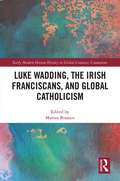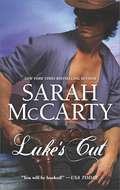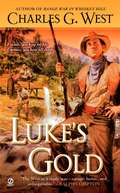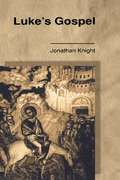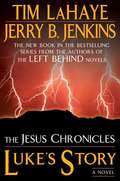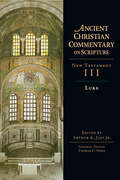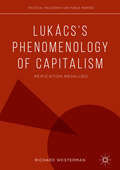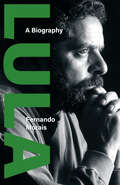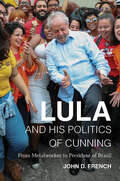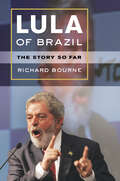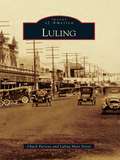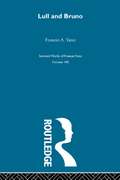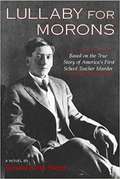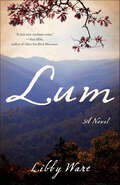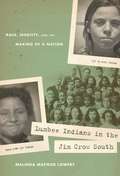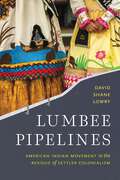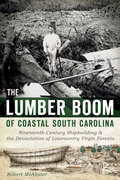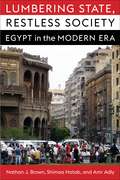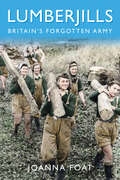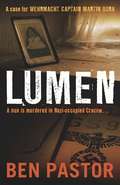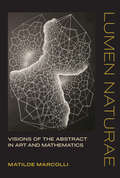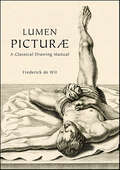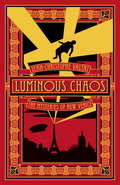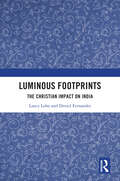- Table View
- List View
Luke Wadding, the Irish Franciscans, and Global Catholicism (Early Modern Iberian History in Global Contexts)
by Matteo BinascoThis book explores the endeavors and activities of one of the most prominent early modern Irishmen in exile, the Franciscan Luke Wadding. Born in Ireland, educated in the Iberian Peninsula, Wadding arrived in Rome in 1618, where he would die in 1657. In the "Eternal City," the Franciscan emerged as an outstanding theologian, a learned scholar, a diplomat, and a college founder. This innovative collection of chapters brings together a group of international scholars who provide a ground-breaking analysis of the many cultural, political, and religious facets of Wadding&’s life. They illustrate the challenges and changes faced by an Irishman who emerged as one of the most outstanding global figures of the Catholic Reformation. The volume will attract scholars of the early modern period, early modern Catholicism, and Irish emigration.
Luke's Cut: A Romance Novel
by Sarah McCartyHe’s the last bachelor standing among the men of Hell’s Eight, and he’ll settle for nothing less than passion…Unencumbered by wife or family, Luke Bellen is the obvious member of Hell’s Eight to lead a treacherous trek across Comanche territory. But Luke suspects he will never know another minute’s peace when photographer Josie Kinder joins the wagon train. Whip-smart Josie has a voluptuous figure, a sunny disposition and a knack for getting into dangerous scrapes in pursuit of the perfect shot. Luke thinks Josie’s too young, too sweet to be despoiled by the rough life and hard-bitten land he loves.But independent Josie won’t let any man—however commanding—decide what’s best for her. Beneath their playful banter is a powerful current of lust—pure, but not so simple. If only Luke weren’t so damned proper, he’d see that the years between them don’t matter a whit, not when a single touch can set them both ablaze. Josie’s hell-bent on having it all, and that includes keeping Luke in the picture…unless the vengeful bandits on their trail find them first.
Luke's Gold
by Charles G. WestCade Hunter never had a place to call home-until veteran ranch hand Luke Tucker saw something worth trusting in him. Which is why Luke shares a secret with Cade. A secret of hidden gold. But when they try find the fortune, a cur from Luke's past murders him and leaves Cade for dead. Now Cade has something to live for-revenge.
Luke's Gospel (New Testament Readings)
by Jonathan KnightLuke's Gospel provides a comprehensive and schematic reading of Luke's Gospel, one of the most important books detailing the life and works of Christ, in six main parts. Knight introduces the Gospel and the narrative theory on which the Gospel rests. He offers a detailed, chapter-by-chapter exposition of the Gospel and also alternative perspectives, such as feminism and deconstruction. He considers the principal motifs of the Gospel, particularly the theme of the temple, which has been previously overlooked in Luke scholarship, arguing that Jesus pronounces the present temple forsaken by God to introduce himself as the cornerstone of the eschatological temple. Finally, he examines earlier readings of Luke's Gospel.Jonathan Knight presents an accessible and jargon-free introduction to the Gospel and makes a valuable addition to the New Testament Readings series.
Luke's Story: By Faith Alone
by Tim Lahaye Jerry B. JenkinsLuke never met Jesus. Unlike the other Gospel writers, he never witnessed Jesus perform miracles or heard Him impart the Word that healed the souls of so many. No, his was a belief built on faith alone, like that of believers today. And his Gospel, filled with the stories of the Lord's divinity, speaks to the hearts of Christians everywhere. In Luke's Story, we follow him as he rises from Greek slave to university-educated physician. Along the way, he meets Saul of Tarsus, a formidable Hebrew debater who becomes both Luke's role model and greatest competitor. Luke is intrigued but skeptical when he hears tales of a man named Jesus who purportedly performs great miracles of healing. But the dramatic story of the conversion and redemption of Saul, now called Paul, and the miraculous healing of one of his own patients by prayer, irreversibly changes Luke's spiritual life. He pledges himself to Christ and makes the life-changing choice to write a Gospel based on years of interviewing believers about their conversions and listening to stories of the Lord's life from those who knew Him-most important, His mother, Mary. Luke wrote his Gospel to appeal to women, nonbelievers, and the disenfranchised. The result is scripture rich in the miraculous stories of Jesus that touches people all over the world today.
Luke: A Theological Exposition Of Sacred Scripture (Ancient Christian Commentary on Scripture #3)
by Arthur A. Just Jr. Thomas C. Odenlectio continua
Lukács After Communism: Interviews with Contemporary Intellectuals
by Eva L. CorredorSince the collapse of communism in Eastern Europe, the validity of Marxism and Marxist theory has undergone intense scrutiny both within and outside the academy. In Lukács After Communism, Eva L. Corredor conducts ten lively and engaging interviews with a diverse group of international scholars to address the continued relevance of György Lukács's theories to the post-communist era. Corredor challenges these theoreticians, who each have been influenced by the man once considered the foremost theoretician of Marxist aesthetics, to reconsider the Lukácsean legacy and to speculate on Marxist theory's prospects in the coming decades. The scholars featured in this collection--Etienne Balibar, Peter Bürger, Terry Eagleton, Fredric Jameson, Jacques Leenhardt, Michael Löwy, Roberto Schwarz, George Steiner, Susan Suleiman, and Cornel West--discuss a broad array of literary and political topics and present provocative views on gender, race, and economic relations. Corredor's introduction provides a biographical synopsis of Lukács and discusses a number of his most important theoretical concepts. Maintaining the ongoing vitality of Lukács's work, these interviews yield insights into Lukács as a philosopher and theorist, while offering anecdotes that capture him in his role as a teacher-mentor.
Lukács’s Phenomenology of Capitalism: Reification Revalued (Political Philosophy and Public Purpose)
by Richard WestermanThis book offers a radical new interpretation of Georg Lukács’s History and Class Consciousness, showing for the first time how the philosophical framework for his analysis of society was laid in the drafts of a philosophy of art that he planned but never completed before he converted to Marxism. Reading Lukács’s work through the so-called “Heidelberg Aesthetics” reveals for the first time a range of unsuspected influences on his thought, such as Edmund Husserl, Emil Lask, and Alois Riegl; it also offers a theory of subjectivity within social relations that avoids many of the problems of earlier readings of his text. At a time when Lukács’s reputation is once more on the rise, this bold new reading helps revitalize his thought in ways that help it speak to contemporary concerns.
Lula
by Fernando MoraisThe first – and long-awaited – major biography of Brazilian president Luiz Inácio Lula da SilvaLula is among the greatest political figures in Brazilian history. The only president in the country with a working-class background, combined with a party that was profoundly original in its roots, he exercised charismatic power and influence in a more lasting way than any other public figure in the republican period.Since 2011, Fernando Morais, one of Brazil's leading writers, has gained direct, frank and frequent access to Lula. To these dozens of hours of testimonies, he has added a reporter's flair and captivating prose to compose a biography that paints a picture in all its grandeur and complexity.In a narrative that makes use of flashforwards and flashbacks to maintain an electrifying pace, Morais goes from Lula's childhood to the annulment of his convictions, in 2021, passing through the new unionism, the ABC strikes, the foundation of the PT and the first election campaign.
Lula and His Politics of Cunning: From Metalworker to President of Brazil
by John D. FrenchKnown around the world simply as Lula, Luis Inacio Lula da Silva was born in 1945 to illiterate parents who migrated to industrializing Sao Paulo. He learned to read at ten years of age, left school at fourteen, became a skilled metalworker, rose to union leadership, helped end a military dictatorship—and in 2003 became the thirty-fifth president of Brazil. During his administration, Lula led his country through reforms that lifted tens of millions out of poverty. Here, John D. French, one of the foremost historians of Brazil, provides the first critical biography of the leader whom even his political opponents see as strikingly charismatic, humorous, and endearing. Interweaving an intimate and colorful story of Lula's life—his love for home, soccer, factory floor, and union hall—with an analysis of large-scale forces, French argues that Lula was uniquely equipped to influence the authoritarian structures of power in this developing nation. His cunning capacity to speak with, not at, people and to create shared political meaning was fundamental to his political triumphs. After Lula left office, his opponents convicted and incarcerated him on charges of money laundering and corruption—but his immense army of voters celebrated his recent release from jail, insisting that he is the victim of a right-wing political ambush. The story of Lula is not over.
Lula of Brazil: The Story So Far
by Richard BourneLuiz Inácio Lula da Silva's dramatic life story has captured the imagination of millions, and his progressive politics have brought hope and excitement to Brazil--and the world. This compelling work is the first major English-language biography of the metalworker who became president of Latin America's largest and most powerful country. In a clearly written, vividly detailed narrative, Richard Bourne describes Lula's childhood hardships in an impoverished family, his days as a revered trade unionist, and the strike movement that brought down Brazil's military dictatorship. The book chronicles Lula's campaigns for the presidency, his first term in office beginning in 2002, a major corruption scandal, and his reelection in 2006. Throughout, Lula of Brazil connects this charismatic leader's life to larger issues, such as the difficulty of maintaining a progressive policy in an era of globalization. Brazil's contemporary history, parallels with other developing countries and other world leaders, the conservatism of Brazilian society, and other themes provide a rich backdrop for assessing the struggles, achievements, and failures of this major figure on both the Brazilian and the world stage.
Luling (Images of America)
by Luling Main StreetOne historian described Luling in the 1870s as "the toughest town in Texas." Along with the railroad came notorious gamblers who were ready to take a man's hard-earned money any way they could. But when settlers enforced what laws there were and established permanent homes, churches, and a school, the rougher crowd sought greener pastures. In the southern corner of Caldwell County, Luling had at first an agrarian-based economy, but that changed with the discovery of oil, which boosted the population from a few hundred residents to several thousand. The oil industry and related businesses kept the population steady. Luling soil also proved beneficial to crops such as cotton, but the area's prize crop became watermelons. Today oil and watermelons keep Luling on the map, and the annual Watermelon Thump attracts thousands. At the crossroads of three important highways, businesses flourish, especially barbecue, which is considered by some to be the best in the state.
Lull & Bruno
by Francis A. YatesFirst published in 1999. Routledge is an imprint of Taylor & Francis, an informa company.
Lullaby For Morons: Based On The True Story Of America's First School Teacher Murder
by Ronald K. SiegelIn 1914, many people in America were being wrongly diagnosed as "morons". Most were committed to asylums. Some committed suicide. Two were childhood friends who became involved in the tragedy of America's first school teacher murder in Poland, New York. The ensuing trial was held in the same Herkimer courthouse as the Gillette-Brown murder case. The trial, which focused on the violent nature of the crime and the "degenerate" behavior of the defendant, quickly eclipsed the Adirondack murder as Upstate New York's "Trial of the Century." Fast-paced and suspenseful, anchored in historical fact, Lullaby For Morons takes us into a dark age of medical and legal thinking and the even darker paranoid world of misdiagnosed victims struggling to survive.
Lum: A Novel
by Libby WareLum has always been on the outside. At eight, she was diagnosed with what we now call an intersex condition and is told she can't expect to marry. Now, at thirty-three, she has no home of her own but is shuttled from one relative's house to another—valued for her skills, but never treated like a true member of the family. Everything is turned upside down, however, when the Blue Ridge Parkway is slated to come through her family’s farmland. As people take sides in the fight, the community begins to tear apart—culminating in an act of violence and subsequent betrayal by opponents of the new road. However, the Parkway brings opportunities as well as loss.
Lumbee Indians in the Jim Crow South
by Malinda Maynor LoweryWith more than 50,000 enrolled members, North Carolina's Lumbee Indians are the largest Native American tribe east of the Mississippi River. Malinda Maynor Lowery, a Lumbee herself, describes how, between Reconstruction and the 1950s, the Lumbee crafted and maintained a distinct identity in an era defined by racial segregation in the South and paternalistic policies for Indians throughout the nation. They did so against the backdrop of some of the central issues in American history, including race, class, politics, and citizenship.Lowery argues that "Indian" is a dynamic identity that, for outsiders, sometimes hinged on the presence of "Indian blood" (for federal New Deal policy makers) and sometimes on the absence of "black blood" (for southern white segregationists). Lumbee people themselves have constructed their identity in layers that tie together kin and place, race and class, tribe and nation; however, Indians have not always agreed on how to weave this fabric into a whole. Using photographs, letters, genealogy, federal and state records, and first-person family history, Lowery narrates this compelling conversation between insiders and outsiders, demonstrating how the Lumbee People challenged the boundaries of Indian, southern, and American identities.
Lumbee Pipelines: American Indian Movement in the Residue of Settler Colonialism
by Dr. David Shane LowryIn Lumbee Pipelines David Shane Lowry (Lumbee) examines the historical and modern paths, or &“pipelines,&” through which members of the Lumbee Tribe of North Carolina maintain Lumbee national identity, community practices, and tribal sovereignty. Through extensive ethnographic research and contextualization, Lowry explores these pipelines: the programs and traditions through which the Lumbee people engineer the settler-colonial conditions that define life in North Carolina and the United States as a whole. Even as the Lumbee community depends on the economics, politics, and histories of settler colonialism, those realities at once threaten Lumbee life, freedom, and community. Despite that conflict, Lumbee people use these pipelines to protect their interests and to influence the world in the realms of public infrastructure and education, healthcare services, humanitarian networks, fossil fuel pipelines, environmental degradation, and artificial intelligence. Lowry paints an intimate portrait of how individual Lumbees define their identities and sense of being, revealing the disputes and affinities between Lumbee community members in various states of accepting and rejecting settler-colonial circumstances.Lumbee Pipelines engages conversations about how, even as American Indian identities and communities are often erased amid the business of contemporary American life, Lumbee people have devised ways to empower and enrich themselves and other peoples by repurposing and evading the genocidal pressures that define settler-colonial society.
Lumber Boom of Coastal South Carolina, The: Nineteenth-Century Shipbuilding and the Devastation of Lowcountry Virgin Forests
by Robert McalisterThe virgin forests of longleaf pine, bald cypress and oak that covered much of the South Carolina Lowcountry presented seemingly limitless opportunity for lumbermen. Henry Buck of Maine moved to the South Carolina coast and began shipping lumber back to the Northeast for shipbuilding. He and his family are responsible for building the "Henrietta," the largest wooden ship ever built in the Palmetto State. Buck was followed by lumber barons of the late nineteenth and early twentieth centuries who forever changed the landscape, clearing vast tracts to supply lumber to the Northeast. The devastating environmental legacy of this shipbuilding boom wasn't addressed until 1937, when the International Paper Company opened the largest single paper mill in the world in Georgetown and began replanting hundreds of thousands of acres of trees. Local historian Robert McAlister presents this epic story of the ebb and flow of coastal South Carolina's lumber industry.
Lumbering State, Restless Society: Egypt in the Modern Era (Columbia Studies in Middle East Politics)
by Nathan J. Brown Amr Adly Shimaa HatabLumbering State, Restless Society offers a comprehensive and compelling understanding of modern Egypt. Nathan J. Brown, Shimaa Hatab, and Amr Adly guide readers through crucial developments in Egyptian politics, society, and economics from the middle of the twentieth century through the present. Integrating diverse perspectives and areas of expertise, including the tools of comparative politics, the book provides an accessible and clear introduction to the Egypt of today alongside an innovative and rigorous analysis of the country’s history and governance.Brown, Hatab, and Adly highlight ways in which Egypt resembles other societies around the world, drawing from and contributing to broader debates in political science. They trace the emergence of a powerful and intrusive state alongside a society that is increasingly politicized, and they emphasize how the rulers and regimes who have built and steered the state apparatus have also had to retreat and recalibrate. The authors also examine why authoritarianism, corporatism, and socialism have decayed without resulting in a liberal democratic order, and they show why Egyptian politics should not be understood in terms of a single dominant force but rather an interplay among many actors. At once current, insightful, and engaging, Lumbering State, Restless Society delivers a powerful and distinctive account of modern Egypt in the modern world.
Lumberjills: Britain's Forgotten Army
by Joanna FoatWhen war was declared in 1939, Britain was almost completely dependent on imported timber – but only had seven months of it stockpiled. Timber was critical to the war effort: it was needed for everything from aircraft and shipbuilding to communications and coal mining. The British timber trade was in trouble. Enter the Lumberjills. Lacking in both men and timber, the government made a choice. Reluctantly, they opened lumber work for women to apply – and apply they did. The Women’s Timber Corps had thousands of members who would prove themselves as strong and as smart as any man: they felled and crosscut trees by hand, operated sawmills, and ran whole forestry sites. They may not have been on the front line, but they fought their own battles on the home front for respect and equality. And in the midst of heavy labour and wartime, they lived a life, making firm friends and even finding soulmates. In Lumberjills, researcher Joanna Foat tells their story for the first time, and gives them the recognition they so truly deserve.
Lumen
by Ben PastorEqual parts wartime political intrigue, detective story, psychological thriller and religious mystery, Pastor's debut follows a German army captain and a Chicago priest as they investigate the death of a nun in Nazi-occupied Poland. Stunned by the violence of the occupation and by the ideology of his colleagues, Bora's sense of Prussian duty is tested to the breaking point.
Lumen Naturae: Visions of the Abstract in Art and Mathematics
by Matilde MarcolliExploring common themes in modern art, mathematics, and science, including the concept of space, the notion of randomness, and the shape of the cosmos.This is a book about art—and a book about mathematics and physics. In Lumen Naturae (the title refers to a purely immanent, non-supernatural form of enlightenment), mathematical physicist Matilde Marcolli explores common themes in modern art and modern science—the concept of space, the notion of randomness, the shape of the cosmos, and other puzzles of the universe—while mapping convergences with the work of such artists as Paul Cezanne, Mark Rothko, Sol LeWitt, and Lee Krasner. Her account, focusing on questions she has investigated in her own scientific work, is illustrated by more than two hundred color images of artworks by modern and contemporary artists. Thus Marcolli finds in still life paintings broad and deep philosophical reflections on space and time, and connects notions of space in mathematics to works by Paul Klee, Salvador Dalí, and others. She considers the relation of entropy and art and how notions of entropy have been expressed by such artists as Hans Arp and Fernand Léger; and traces the evolution of randomness as a mode of artistic expression. She analyzes the relation between graphical illustration and scientific text, and offers her own watercolor-decorated mathematical notebooks. Throughout, she balances discussions of science with explorations of art, using one to inform the other. (She employs some formal notation, which can easily be skipped by general readers.) Marcolli is not simply explaining art to scientists and science to artists; she charts unexpected interdependencies that illuminate the universe.
Lumen Picturae: A Classical Drawing Manuel
by Frederick de WitLumenPicturaeis apictorial guide to classicaldrawing as exemplified by the sublime work of the influential 17th centuryDutch engraver Frederick de Wit. Presenting a carefully curated set of imagesnever before seen outside of rare book archives, Lumen Picturaerenders de Wits’ incomparable figure drawings available to the public forthe first time. In the tradition of Harold Speed’s The Practice and Scienceof Drawing, Andrew Loomis’s Figure Drawing for All It’s Worth,Gottfried Bammes’ Der NackteMensch, and George Bridgman's Complete Guide to Drawing from Life,the step-by-step visuals in Lumen Picturae arean indispensible handbook for visual artists both professional and amateur, andfor readers of any age or language who want to incorporate the incomparableinsight of classical Dutch figure studies into their drawing today.
Luminous Chaos
by Jean-Christophe Valtat Mahendra SinghBook two in The Mysteries of New Venice, the steampunk adventure series The Guardian called a "magnificent achievement" It's 1907 in the icily beautiful New Venice, and the hero of the city's liberation, Brentford Orsini, has been deposed by his arch-rival -- who immediately assigns Brentford and his friends on a dangerous diplomatic mission to Paris.So, Brentford recruits his old friend and louche counterpart, Gabriel d'Allier, underground chanteuse and suffragette Lillian Lake, and the mysterious Blankbate--former Foreign Legionnaire and leader of the Scavengers, the city's garbage collecting cult--and others, for the mission.But their mode of transportation--the untested "transaerian psychomotive"--proves faulty and they find themselves transported back in time to Paris 1895 ... before New Venice even existed. What's more, it's a Paris experiencing an unprecedented and crushingly harsh winter.They soon find themselves involved with some of the city's seediest, most fascinating inhabitants. But between attending soirees at Mallarmé's house, drinking absinthe with Proust, trying to wrestle secrets out of mesmerists, and making fun of the newly-constructed Eiffel Tower, they also find that Paris is a city full of intrigue, suspicion, and danger.For example, are the anarchists they encounter who are plotting to bomb the still-under construction Sacre Coeur church also the future founders of New Venice? And why are they trying to kill them?And, as Luminous Chaos turns into another lush adventure told in glorious prose rich in historical allusion, there's the biggest question of them all: How will they ever get home?ebook ISBN: 978-1-61219-142-3
Luminous Footprints: The Christian Impact on India
by Lancy Lobo Denzil FernandesChristianity in the Indian subcontinent is as old as Christianity itself, although Christians have consistently remained a small minority within the broader population. This book delves into the encounters between Christianity and the Indian people across various historical periods, highlighting the exchange of knowledge and ideas.This book examines the influence of Christianity on Indian society, focusing on the cultural, economic, and intellectual contributions of Christians across various domains—including education, healthcare, social services, economic development, the arts, architecture, languages, culture, politics, public administration, and the armed forces. The book examines key figures, organisations and institutions to trace the significant role Christians have played in the country's freedom struggle, nation-building efforts, and social development, leaving a lasting impact on the shaping of modern India.This book will be of interest to general readers and students and researchers of social science, religion, history, anthropology, sociology, and political science.
